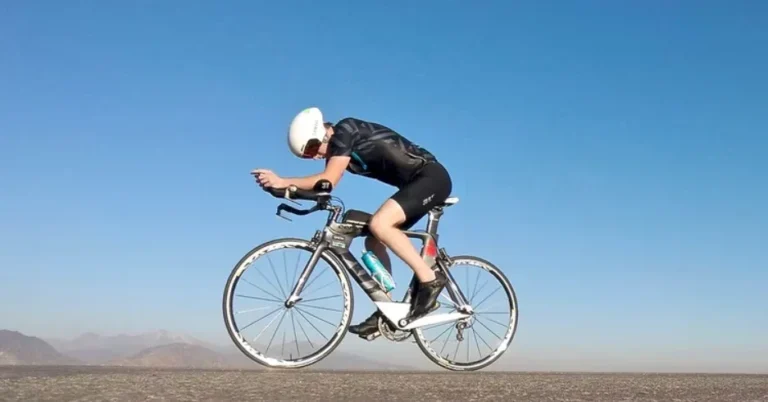If you weigh less, you’ll be faster on race day. That’s a fact!
However, losing too much weight too quickly can be dangerous. But don’t worry, we got all the answers for you here!
The ten summarized tips for weight loss
Before we deep-dive into the article, here are the summarized most essential tips for losing weight as a triathlete:
- To lose weight, you’ll have to be at a calorie deficit. Stay a tiny amount below the daily amount of calories you need and eat healthily – your body needs nutrients, especially during triathlon training. My best tip is to eat less than you usually would. Trust me, it works! Counting calories is just too much work.
- Take the stairs everywhere you go! I’m serious. This is one of the most effective ways to lose weight. In a day, you burn a certain amount of calories. The more you do, the more you burn – and everything counts!
- Cut out alcohol completely. Yes, also the occasional wine and beer. Alcohol contains a lot of useless calories. And I’m sure you can wait until after the race.
- Eliminate liquid calories. Drink only water when you’re not training. Sports drinks are okay during bike rides or before training sessions – you’ll need the energy!
- Eat less, more often. While there is debate whether or not this helps you lose weight, it certainly helps your training. Essentially you have to avoid over-eating. It will make your workouts much harder to complete, thus burning fewer calories.
- Do not eat before bedtime.
- Cut out cheat meals. Seriously, it’s much easier to eat clean if you do it all the time.
- Eat carbohydrates after your workouts. While this doesn’t help you lose weight directly, it’s crucial. You’re depleting your energy storage (glycogen) when you’re training. Even though you’re trying to lose weight, consuming a carbohydrate-rich snack is essential to replenish the storage. It’s much better to have energy for the next training session than to starve yourself.
- Trust the process! This is very important; You’ll have to trust that you’ll lose weight if you train hard and eat healthily.
- Weigh yourself at the same time of day! Preferably after you’ve gone to the toilet in the morning. For example, I weigh 185 pounds in the morning and sometimes weigh 193 pounds at night. It all depends on when you’ve gotten to the toilet, when you’re eating, how much water you’ve been drinking, and if you’ve been training.
There is no denying that weighing less allows you to be faster on race day
On a bike, a pound or two of additional bodyweight demands 3-4 watts to climb up a hill, while jogging costs around 4 seconds per mile. That may not seem like much, but imagine losing 3 kg. Furthermore, weighing less will help your tendons on race day. However, it’s a fine line. You want to lose weight, but not so much that you also lose strength.
I’ve gathered some of the tips I used for my Ironman race in 2021. I lost 15,5 pounds (7 kgs) during three months, from 190 to 174,5 pounds. And most importantly, I felt GREAT at the start line, even though I’ve never weighed so little.
Related reads: What to snack on during a triathlon race

The Daily Triathlon Diet
Your daily diet is far more critical than training when losing weight. The first step to weight loss is to eat a clean and healthy diet.
Secondly, you need to recognize that It takes time to lose weight the healthy way.
We all know we need to eat less to lose weight; however, you must never go too low as your training sessions demand a lot of energy consumption. Aim for a daily calorie deficit of around 300 calories. This will allow you to lose weight while you’re improving your fitness.
If you restrict your calorie intake too much, and thus the intake of nutrients, your endurance growth will halt. It can undoubtedly derail your fitness and cause heaps of additional issues for you. Never overdo it!
Related reads: Nutrition for beginner triathletes – Here is all you need to know

The LCHF diet for triathletes
The Low Carb High Fat (LCHF) diet is one way to rapidly lose weight. 43-year-old Nikhil Kanodia, an Ironman triathlete and open water swimmer dropped 20 kgs in 3 months following this diet. His proclaimed weight loss should be taken with a grain of salt. 20 kgs is A LOT in three months. He ate the following:
- Breakfast: 1 whole egg + 2 egg whites’ omelets/fried egg + 200g avocado or veggie salad + cup of black coffee.
- Snack in the middle of the morning: papaya or melon (200g)
- Lunch: food consisting of 1 vegetable curry (150g (about half the weight of a can of soup)) + a portion of sautéed veggies (100g (about the weight of a deck of playing cards)) + 1 chicken dish (200g) + bread prepared from nut/seed flour.
- Snacks: berries and a cup of black coffee (150g (about half the weight of a large grapefruit))
- Dinner: Sautéed vegetables with grilled chicken, fish, or lamb (200g (about twice the weight of a deck of playing cards)
The LCHF diet is very effective in weight loss. However, it’s a very advanced method. I’ll definitely suggest using the intermittent fasting method if you’re new to loosing weight.
Intermittent fasting for weight loss
If you don’t know what Intermittent fasting is, it’s essentially just quitting breakfast.
Fasting is the most common strategy for weight loss. And studies have shown that intermittent fasting can help you lose weight very effectively. Another a study even suggested that it caused less muscle loss than standard continuous calorie restriction.
And its effectiveness is quite logical if you think about it. Cutting out the first meal of the day will automatically reduce the number of calories you consume in a day.
Intermittent fasting methods
There are a few ways of intermittent fasting. I would recommend the 16/8 method for triathletes. It’s the most sustainable method that will give you energy for your training sessions.
- The 16/8 method is a method where you restrict your eating to 8 hours a day and fast for 16 hours. This is the most common method. This is my favorite! Typically I’ll restrict my eating to 12:00 PM to 8:00 PM.
- The Eat-Stop-Eat method involves fasting for 24 hours once a week. It’s effective, but I wouldn’t recommend it for triathlon training.
- The 5:2 method involved eating 500 calories for two days of the week and normally for the other fíve days. I do not recommend this for triathlon training either.
Commonly asked questions on weight loss for triathletes.
I’ve cut weight several times during my triathlon career. For an Ironman Race, I’ll cut 15 – 20% of my total weight. So I’ve done it quite a few times.
I often get asked several questions regarding weight loss for triathletes. I’ll attempt to answer them here.
Q: How much weight do you lose training for a triathlon?
The amount of weight you’ll lose training for a triathlon depends on how much you weigh beforehand and how long you train for your specific triathlon race.
If you follow a 12-24 month training plan for an Ironman race, you can generally expect to lose over 20% – 30% of your total weight.
If you train for three months for a sprint triathlon, you can expect to lose 10% of your total weight. However, if you focus on your diet, you can expect much more! As mentioned, the 43-year-old Nikhil Kanodia lost 44 pounds (20 kgs) in 20 months.
Q: Is triathlon good for weight loss?
Yes. Triathlon is great for weight loss! During triathlon training, you’ll use most of your body’s muscle groups. And that’s great for losing weight.
Longer triathlon races will require longer training sessions. People training for Ironman races will typically train for 10-17 hours per week. Training for that long will naturally cause you to lose weight.
Q: What is the ideal triathlon weight?
There is no ideal weight; it depends on the individual triathlete’s goals. However, most professional triathletes weigh under 170 pounds (76 kgs).
Q: How do you lose fat while training for a triathlon?
A great way to lose fat while training for a triathlon is to stay below 70% of your heart rate. This heart rate zone is called the “fat-burning zone.” In this zone, your body will use fat, instead of carbohydrates, for energy.
If you don’t have a heart rate monitor, you’ll know if you are in the fat-burning zone when you can sustain your activity for more than 1-2 hours.
You’re not b
Conclusion
Losing weight as a triathlete is different from regular weight loss plans because you’ll need lots of energy for your training sessions.
You’ll be golden if you follow y 10 tips for losing weight as a triathlete. Furthermore, I’ll recommend the 16/8 intermittent fasting method if you have a lot of weight to lose. However, fueling up on carbohydrates is more important if you’re going out for a long training session in the morning.
